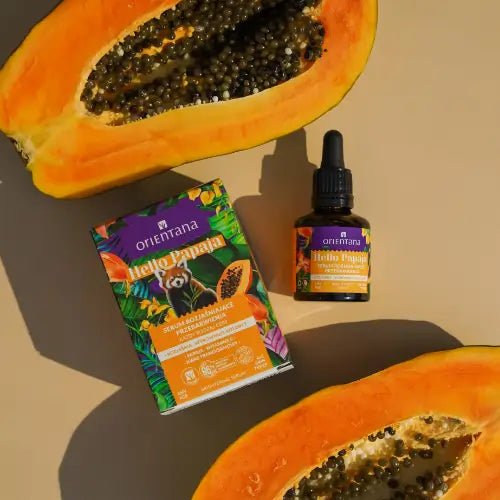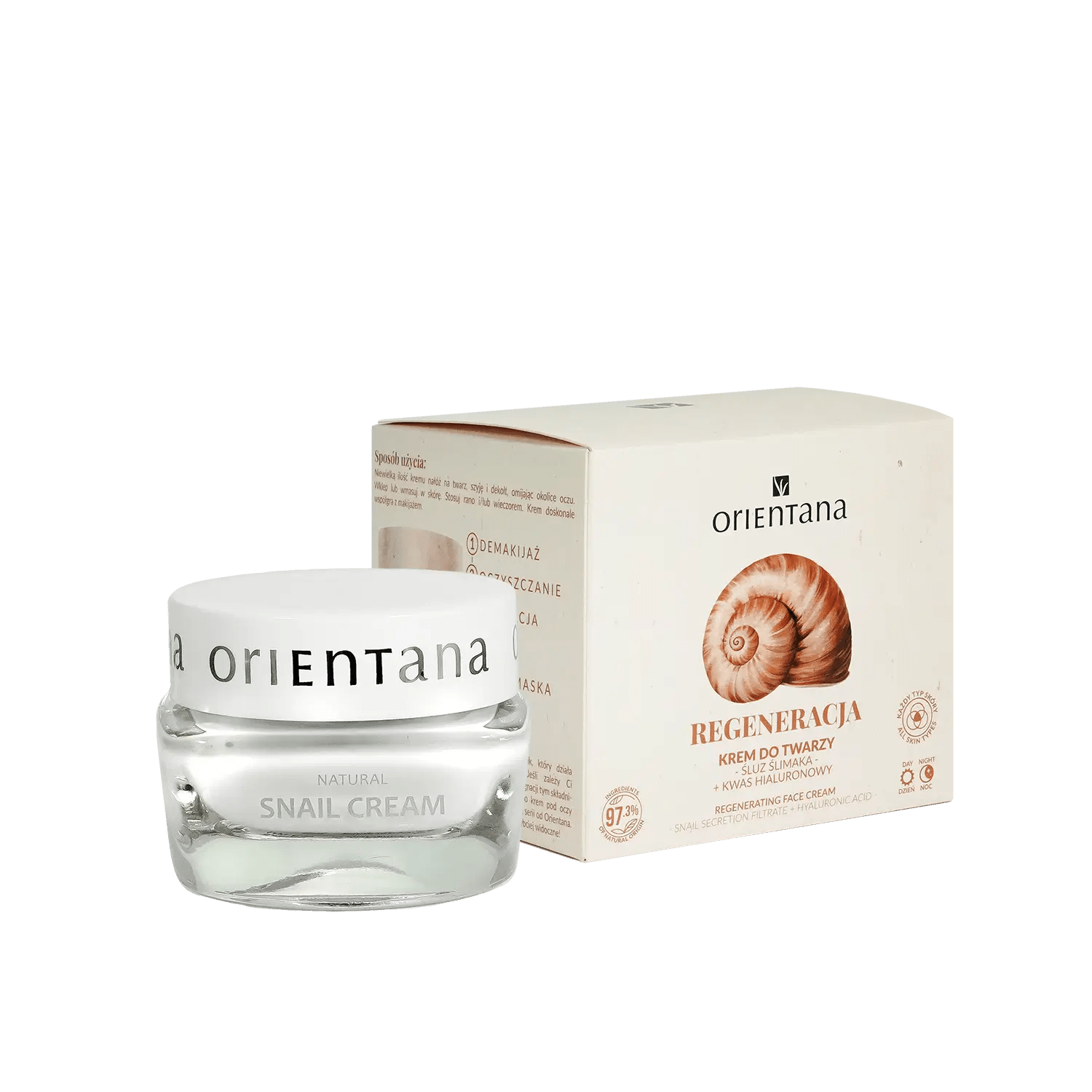Vitamin C serum is a popular skincare product because it has many benefits, such as brightening the complexion, reducing discoloration, and protecting against free radical damage. Not sure how to get rid of discoloration? Looking for an effective serum? Read the entire post.
Vitamin C Face Serum - Different Types of Vitamin
In cosmetology, this vitamin is found in various forms, which differ in stability, effectiveness and use in cosmetics. Below we present the most popular ones. Miracle serum does not exist? It depends on how you choose the type of vitamin C.
Ascorbic Acid is the purest and most active form of the vitamin. It has a strong antioxidant effect, brightens skin spots, and stimulates collagen production. Unfortunately, this form of the vitamin is unstable and susceptible to oxidation, especially in contact with air, light, or high temperatures. Most often found in serums in concentrations of 5–20%. Requires an appropriate pH (below 3.5) to maintain effectiveness.
Sodium Ascorbyl Phosphate (SAP) is a stable, water-soluble form of the vitamin. It is milder than ascorbic acid, suitable for sensitive skin. It helps fight acne, but is less effective than the pure form of the vitamin. Often used in facial serums with anti-acne vitamin C.
Magnesium Ascorbyl Phosphate (MAP) is a stable, water-soluble form of the vitamin, and its effectiveness is observed at lower concentrations (approx. 5%). It is gentle to the skin, strongly moisturizes and has anti-inflammatory effects, but less effective than pure ascorbic acid in high concentrations. It is often a component of serums for dry and sensitive skin.
Tetrahexyldecyl Ascorbate (THDA) is a lipophilic (fat-soluble) form of the vitamin. It penetrates deeper into the skin layers and is well tolerated even by sensitive skin. It is stable and highly effective in eliminating discolorations and stimulating collagen. The disadvantage is its price. This ingredient is much more expensive than other forms. We can find it in an exclusive serum.
Ascorbyl Palmitate is a stable, lipophilic form of the vitamin. It combines the antioxidant properties of the vitamin and fats. It is gentle on the skin, but less effective in brightening than pure ascorbic acid. Used as an additive to nourishing and protective cosmetics.
Ascorbyl Glucoside is a stable form of vitamin linked to a glucose molecule. It acts gently, releasing the vitamin in the skin gradually. It brightens spots on the skin and supports collagen synthesis. It requires enzymatic activation in the skin, which may reduce effectiveness. Used as an active ingredient in serums for sensitive skin.
Ethyl Ascorbic Acid is a stable, water-soluble form of vitamin with an ethyl group. Its advantage is high stability, good skin penetration, brightening and anti-aging effects. However, it may be less effective than ascorbic acid in the short term. This type of vitamin can be found in serums for oily, combination and aging skin.
3-O-Ethyl Ascorbic Acid (3-O-Ethyl Ascorbic Acid) is an ethylated, highly stable form of vitamin C, highly soluble in water. It has a brightening effect, reduces hyperpigmentation and supports collagen synthesis. This ingredient is expensive so we will find it in high-quality anti-aging and brightening serums, also for sensitive skin.
Different forms of the vitamin in cosmetics are tailored to the needs of different skin types. We most know this vitamin as a remedy for hyperpigmented skin and skin that needs radiance. In this post, you will learn about additional properties of vitamin C.
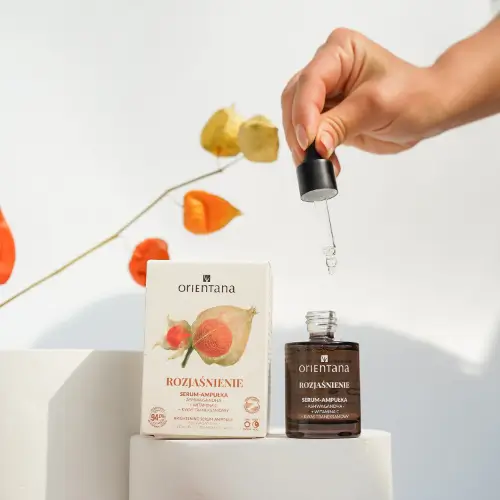
Brightening Face Serum - A Bit of History
This vitamin is one of the most popular and most commonly used active substances in cosmetology, an antioxidant valued for its versatility and effectiveness. Its popularity stems from its unique care properties, which meet the needs of many skin types and skin problems.
The use of the vitamin in cosmetology developed gradually with the progress of scientific research and the cosmetics industry. Japan was one of the first countries to widely use the vitamin in cosmetology in the 1970s and 1980s.
Japanese cosmetics companies, such as Shiseido , were pioneers in using the vitamin and its stable derivatives, especially in skin-lightening products. These products were part of popular skin-care lines in Asia for even skin tone.
Something for mature skin care and wrinkles? In the 1980s and 1990s, American scientists and cosmetic companies began using the vitamin in anti-aging cosmetics.
Skinceuticals , founded by Dr. Sheldon Pinnell, was one of the first to develop a pH-balanced, stable serum form of the vitamin, which was a breakthrough in anti-aging care. Dr. Pinnell, a dermatologist and scientist, introduced formulas based on scientific research on the effectiveness of the vitamin in reducing the signs of aging and protecting the skin from UV radiation.
The vitamin was studied as a skin care ingredient as early as the mid-20th century, but its mass introduction to cosmetology took place in the 1970s and 1980s.
The reason for its popularity is its strong antioxidant properties, as it neutralizes the effects of free radicals, which are the main cause of skin aging. Are you dreaming of a good face serum with vitamin C? Check out professional treatments.
Vitamin C in beauty salons and aesthetic medicine
This vitamin is an irreplaceable ingredient in both cosmetology and aesthetic medicine. Thanks to its wide range of applications – from brightening and revitalizing treatments to advanced anti-aging therapies – it is one of the most versatile and popular ingredients in the beauty industry.
Its use brings fast and visible effects, which is why it enjoys great interest among both cosmetologists and aesthetic medicine patients. It will be appreciated by skin that needs smoothing, skin that needs rejuvenation, skin that needs irritation reduction.
In beauty salons , popular treatments with vitamin include needle-free mesotherapy, sonophoresis, chemical peels with vitamin, masks and ampoules with vitamin and rejuvenating treatments when it is used in combination with other ingredients, such as hyaluronic acid or retinol, to improve skin firmness.
In aesthetic medicine, this vitamin is used in more advanced treatments that allow you to achieve long-term effects in improving the condition of the skin. The active ingredient is introduced deep into the skin using microinjections. This is a needle mesotherapy treatment. This treatment provides intensive skin brightening, firming and reduction of hyperpigmentation.
Vitamin cocktails are also popular. These are mixtures of vitamins with other active ingredients, e.g. hyaluronic acid, amino acids, applied in revitalizing treatments. The effect is skin rejuvenation, regeneration, wrinkle reduction. Vitamin preparations are used as a support for laser therapies or chemical peels in the treatment of skin hyperpigmentation.
Often used for mature skin and skin that needs brightening. Elimination of hyperpigmentation, anti-aging effect and wrinkle reduction will be obtained after biorevitalization. During this treatment, the vitamin is applied to the skin of the face, neck, décolleté and hands for intensive regeneration.
Recommendations after treatments for skin with discoloration
It is necessary to use creams with sunscreens because after the treatments the skin may be more sensitive to the sun. It is necessary to use creams with SPF 30 or higher. It is also important to use cosmetics that will strongly moisturize the skin . Pay special attention to dehydrated skin. After the treatments, you should avoid aggressive cosmetics (e.g. with AHA/BHA acids) for a few days to avoid irritation.
Who are vitamin treatments for?
- For people with hyperpigmentation and uneven skin tone.
- For skin that needs radiance, for skin that is tired and grey.
- For skin exposed to UV rays and pollution.
- For skin with the first signs of aging, mature skin, skin in need of regeneration and firming.
- For vascular skin
What does vitamin C serum do?
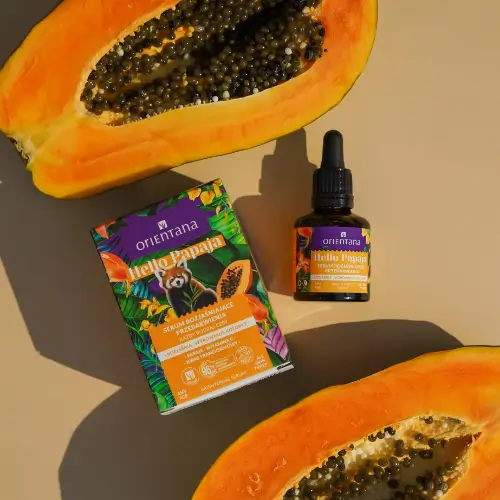
This vitamin has a versatile and beneficial effect on the skin, making it one of the most valued ingredients in cosmetology and aesthetic medicine.
It is an antioxidant that protects the skin, has antioxidant effects. It neutralizes free radicals created by UV rays, pollution and other environmental stressors. It protects cells from oxidative damage that accelerates the skin aging process.
It stimulates the production of collagen , which is necessary for this. As a result of this action, wrinkles are reduced. Regular use of the vitamin helps reduce the visibility of unevenness and improve the structure of the skin.
Lightens discolorations and evens out skin tone because it inhibits melanogenesis, i.e. stops the activity of the tyrosinase enzyme, which is involved in the production of melanin (skin pigment). Helps lighten sun spots, melasma, acne lesions and other pigmentation changes. Improves skin tone, giving it a healthier and more radiant appearance.
It has anti-inflammatory properties, which makes it helpful in soothing acne, redness and irritation. It speeds up the healing of minor wounds and supports skin regeneration after cosmetic procedures.
The vitamin improves the texture and hydration of the skin, supports the regeneration of the epidermis, making the skin smoother and softer. Supports the hydrolipid barrier, as it improves the ability to retain moisture, which makes the skin better moisturized.
Sensitive skin will love it because it reduces redness and strengthens the walls of blood vessels, which helps reduce redness and visible capillaries.
Can vitamin C serum be used with another ingredient?
This vitamin is an extremely versatile ingredient, and its effects can be enhanced or supplemented by combining with other active substances. Appropriate combinations of ingredients allow for increased stability, improved absorption and more versatile care effects.
Vitamin-enhancing ingredients - daily facial care
Vitamin E (Tocopherol)
- Why does it work? : Vitamin E is also a powerful antioxidant. Together with vitamin E, they create a synergistic combination, mutually regenerating their antioxidant properties.
- Effects : Increased protection against free radicals; Strengthening UV protection; Reduction of visible signs of aging.
This combination will work well in cosmetics that have anti-aging properties and moisturize the skin.
Ferulic Acid
- Why does it work? : Ferulic acid stabilizes the vitamin, improving its durability and effectiveness.
- Effects : Strengthening of the antioxidant effect; Increased protection against UV radiation; More intense skin brightening.
Ferulic acid with vitamin C is suitable for dull skin, skin that needs to reduce sun spots, and skin that needs smoothing.
Tranexamic acid
- Why does it work?: Effectively reduces discoloration.
- Effects : Brightening of the skin; Better hydration and unification of skin tone.
Perfect combinations for skin in need of brightening and skin in need of radiance.
Hyaluronic acid
- Why does it work? : Hyaluronic acid supports skin hydration, which is crucial for the vitamin to work effectively.
- Effects : Better skin hydration; Improved skin elasticity and smoothness; Minimized irritation.
This combination will be loved by skin that needs hydration, dehydrated skin, and skin that needs smoothing.
Retinol (Vitamin A)
- Why does it work? : Both vitamins enhance each other's anti-aging effects.
- Effects : Increased collagen production; Better wrinkle reduction and even skin tone; Improved skin texture.
These ingredients should be used with caution, as both can be irritating. It is best to introduce them alternately (e.g. vitamin in the morning, retinol in the evening). Perfect for mature skin care. They will be appreciated by skin with imperfections and combination skin.
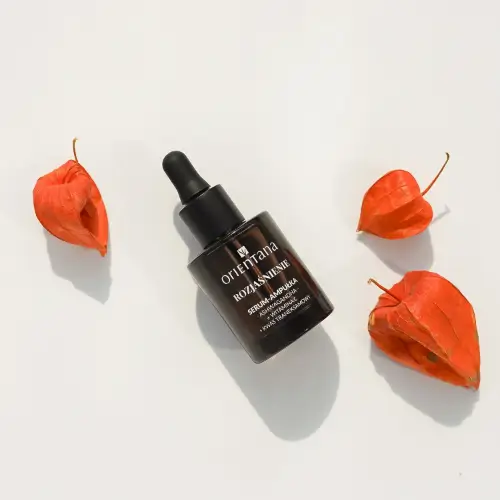
Ingredients supporting vitamin absorption and stability
Peptides
- Why does it work? : Peptides can support skin regeneration and improve penetration into the skin.
- Effects : Stimulation of collagen synthesis; Strengthening of skin elasticity; Improvement of cell regeneration.
Use the peptide serum in the morning and the vitamin C face serum ampoule in the evening. They will beautifully brighten the skin.
Ceramides
- Why does it work? : Ceramides support the skin's protective barrier, which allows the vitamin to work more effectively. This combination will be appreciated by skin in need of regeneration.
- Effects : Better skin protection against moisture loss; Lower risk of irritation.
Use the serum with ceramides in the evening and the serum with vitamins in the morning. This routine moisturizes the skin, especially dehydrated skin. It will work well for skin that needs rejuvenation.
Glutathione
- Why does it work? : Glutathione is a powerful antioxidant that enhances the effects of the vitamin.
- Effects : antioxidant effect; Supports skin detoxification; Radiant skin.
Skin with the first signs of aging will love this interaction of ingredients.
Ingredients that complement the action of the vitamin
AHA/BHA acids
- Why does it work? : Fruit acids (AHA) and salicylic acids (BHA) support exfoliation of the epidermis, which increases absorption.
- Effects : Faster skin brightening; Reduced visibility of sun spots; Reduced visibility of pores; Improved skin texture.
However, they must be used with caution to avoid irritation, especially when using the vitamin in high concentrations and one after the other.
Our suggestion is to use acids in the Hello Daktyl acid peeling once a week, and every evening a serum and micro-exfoliating cream with Hello papaya vitamin, in the morning - serum + energizing cream with Hello Papaya vitamin. This is a good solution for skin with imperfections.
Allantoin and panthenol
- Why does it work? : Allantoin and panthenol have a soothing effect that counteracts potential irritation caused by the vitamin.
- Effects : Reduced risk of redness; Improved comfort of using cosmetics with vitamin.
For sensitive skin, we recommend using the Kali Musli day cream and Kali Musli night cream after the BRIGHTENING serum.
The vitamin works great with many ingredients that enhance its effects, improve stability, and expand the range of benefits. Here are some recommendations:
- Anti-aging care : Vit C + vitamin E + ferulic or tranexamic acid
- Brightening and evening out of skin tone : Vitamin C + niacinamide + AHA acids.
- Skin in need of regeneration : Vitamin C + retinol + peptides.
- Moisturizing and soothing : Vitamin C + hyaluronic acid + allantoin.
- Combination skin: Vit. C + niacinamide + panthenol
The key to success is to choose the right combinations for your skin type and needs, and to use the products as recommended to avoid irritation.
What not to combine with vitamin C serum in one routine
Copper and Copper Peptides - Copper can react with the vitamin, reducing the effectiveness of both ingredients. Use these ingredients at different times of the day.
Chemical Peels and Exfoliants - These can increase skin sensitivity and lead to irritation. After chemical peels, wait a few days before introducing vitamin products.
AHA and BHA acids - Acids such as glycolic or salicylic acid operate at very low pH, which can reduce the stability of the vitamin form of ascorbic acid. Combining them can increase the risk of irritation and dry skin. Use them on different days or at different times of day.
Retinol and its derivatives (vitamin A) - Retinol works in a different pH range than the vitamin, which can reduce effectiveness if used together. The combination of these two ingredients can increase the risk of irritation, especially in people with sensitive skin. The vitamin should be used in the morning (as an antioxidant effect), and retinol in the evening (regenerative effect).
Unstable combination with niacinamide (vitamin B3) - Niacinamide can potentially neutralize the effect of ascorbic acid (pure vitamin), especially in an environment with
What vitamin C serum? It depends on the concentration
The best concentration of vitamin C in a serum depends on your skin type, sensitivity and skin care goals.
Low concentrations (5-10%) should be used by people who are new to using vitamins. A great serum is the Hello Papaja series. People with sensitive skin, prone to irritation or with rosacea will also be happy with this great product. We recommend it for use as an anti-aging effect and to even out skin tone. It will also work well as a brightening serum.
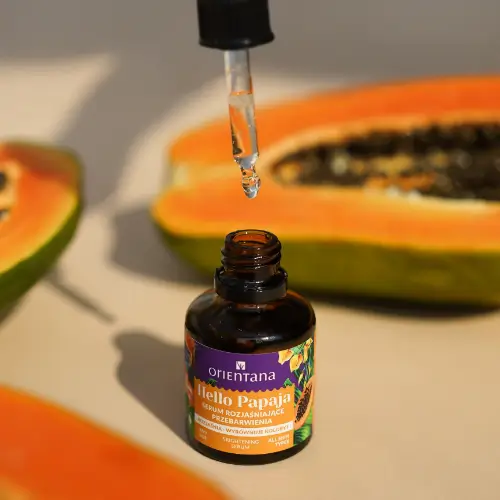
Medium concentrations (10-15%) can be used by people with normal, combination or slightly oily skin who want to introduce effective anti-aging care. However, you should be careful and perform tests and introduce gradually starting with lower concentrations. Side effects, such as skin irritation, may occur. Such concentrations are used as prevention of aging and reduction of imperfections. However, not every day and only for skin that is very hardened.
High concentrations (15-25%) are safest to take under the supervision of a beautician, in treatments performed outside the home. They can be taken by people accustomed to the effects of the vitamin, with normal or oily skin, and Skin resistant to acids and active ingredients. They will work for people with visible discoloration, or advanced signs of aging. Treatments used under the watchful eye of a specialist will bring visible reduction of discoloration, furrows and improvement of skin firmness.
How to choose the best concentration?
- Novices: Start with a low concentration (5-10%) and increase gradually.
- Sensitive skin: Concentrations of 5-10% and stable forms of vitamin C (e.g. ascorbyl tetraisopalmitate).
- Normal/combination skin: Concentration 10-15% in salons.
- Oily or mature skin: Concentrations of 15-20% may produce the best results, under the supervision of a specialist.
Forms of vitamin C and concentration
Different forms of the vitamin differ in their effects and tolerance:
- L-Ascorbic Acid: Most active, but potentially irritating. Effective at concentrations of 10-20%.
- Ascorbyl tetraisopalmitate: A stable and gentle form, often used in lower concentrations (2-10%).
- Ascorbyl Glucoside: Stable form, works at 5-10% concentrations.
When should you not use vitamin C?
This ingredient should not be used on very irritated or damaged skin. Vitamin in the form of ascorbic acid can cause burning and redness on damaged skin. The skin should be well healed or a more gentle form of the vitamin, such as ethyl ascorbic acid, should be chosen.
Do not use vitamin C serum on very sensitive skin. It may react with irritation to the vitamin in higher concentration (e.g. above 10%). Choose products with lower concentration of vitamin C (5-10%) as in the BRIGHTENING serum.
Avoid taking the vitamin during the day if you do not plan to use sunscreen.
Pregnant (in some cases) - High concentrations of vitamin C (especially in the form of ascorbic acid) can be irritating to sensitive skin, which is common in pregnancy. Choose more gentle forms or consult your doctor and dermatologist.
Using a vitamin after invasive cosmetic procedures is not recommended, because the skin after such procedures as microdermabrasion, laser therapy or deep peelings is more sensitive and prone to irritation. Wait a few days or use gentle forms of the vitamin after consulting a cosmetologist.
The best Vitamin C Serum? Check out these from Orientana
In the Orientana offer you will find a unique face serum with vitamin C, which perfectly fits into the brand's philosophy - natural care, inspiration from Asian nature and effectiveness confirmed by research. This product is an absolute must-have in your daily care routine. Three types of such serums have effective and well-combined active ingredients.
Orientana products are distinguished by their natural formulas that combine plant ingredients from ecologically clean regions of Asia.
- Hello Papaya Brightening Discoloration Serum 30 ml – ideal for those looking for simplicity and effectiveness in care. A nice serum with a shortened number of ingredients. In addition to 3-O-ethyl ascorbic acid, it contains papaya extract. It has an antioxidant effect, brightens the skin and moisturizes, and it will be appreciated by both skin with the first signs of aging and skin in need of moisture. This great serum, after which the skin looks like new, can also be purchased at Rossmann drugstores.
The consistency of the serum is light, watery and quickly absorbed. This serum with vitamin C has a price of PLN 40.
- Serum Ampoule Ashwagandha, vitamin C and tranexamic acid 30 ml - BRIGHTENING - a sensational serum enriched with active ingredients such as ashwagandha and tranexamic acid, which additionally soothe inflammation and strengthen the skin's protective barrier. The serum perfectly brightens discolorations, has anti-aging effects, adds shine to gray skin, skin in need of moisture will like it. 3-O-Ethyl ascorbic acid enriched with additional antioxidants from mango, papaya and pineapple is a great serum for every age.
The serum's consistency is slightly gel-like and absorbs well. This is a great product at the price of PLN 65, which you can also find in Hebe Drugstores .
- Serum with vitamin C and mulberry - pure L-ascorbic acid enhanced with mulberry extract, which supports the brightening of sun spots, is a super serum that beautifully illuminates the skin, suitable for oily skin, skin with imperfections and dry skin, but vascular skin will not like it.
The consistency of the serum is gel-like.
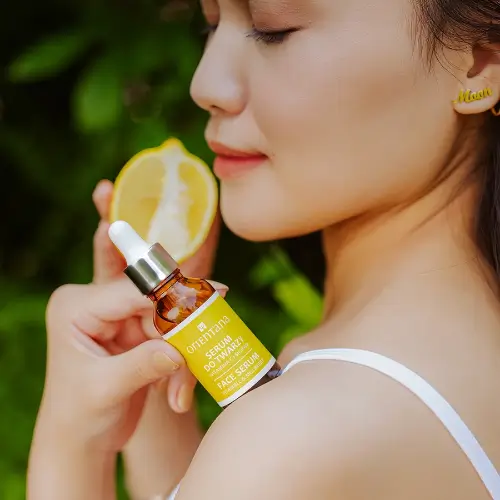
Vitamin C serums from Orientana are universal cosmetics – they are suitable for both day and night use. During the day, we recommend applying them under a cream with a filter to enhance protection against UV radiation. At night, they have a regenerating effect, supporting skin renewal processes. They will work well as a brightening serum that gives the skin a healthy look.
- Reviews of Vitamin C Serum
Our clients' opinions are visible on the Orientana website:
A wonderful serum, calms inflammation, reduces redness. With longer use it brightens the complexion a bit and reduces discoloration. Not suitable under makeup - I use it at night.
It refreshes, moisturizes, and has a beautiful scent that stimulates me to act.❤️Great serum
I've been using the serum for a short time now. It's a fantastic serum for a young mother.
The serum has a beautiful oriental scent, absorbs perfectly, and my skin reacts positively to it from the first use ❤️
Eliminates discoloration and all traces of imperfections. My favorite product
Great product. Super moisturizing.
My next package, I will definitely buy again. 🔥👍️
Excellent. Great product. I'm already using another package of serum
Very pleasant smell, absorbs well. The skin is moisturized and nourished 🔥 The serum works great.
I've been using the serum for a short time, but I can already see the effects.
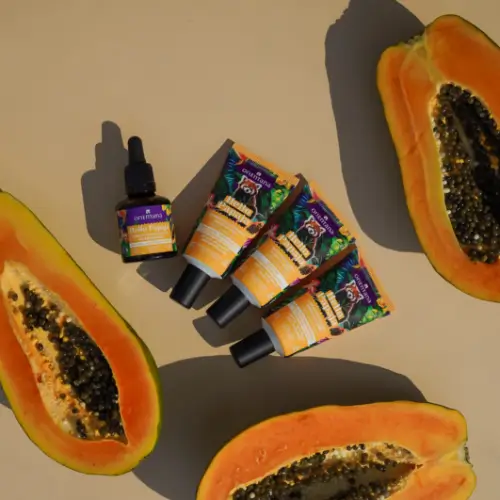
Vitamin C - when to apply serum? How to choose for your skin type?
L-ascorbic acid and its various forms work great in serums for all skin types.
Used for mature skin : Wrinkle reduction, firming, moisturizing and improving skin elasticity.
Skin with hyperpigmentation Brightening and evening out of skin tone, illuminating the skin and moisturizing.
Acne skin : Reduction of inflammation and acne skin lesions,
Sensitive skin : Strengthens the protective barrier and reduces irritation.
Tired and grey skin : Restoring radiance and energy.
Vitamin C serum can be used from a relatively young age, as its properties are beneficial to the skin regardless of age. However, it is crucial to choose the right product and concentration for the skin's needs at a given stage of life.
In the teenage years (from about 15-16 years of age) vitamin C can be used as prevention against environmental pollution, skin lightening and support in the treatment of acne discoloration. It is important to choose products with low concentration (e.g. 5-10%) and in a delicate formula to avoid irritation. Are you looking for a good antioxidant? Do you want a brightening effect? Go for this product.
In young adults (20-30 years old), vitamin C has a preventive effect against premature skin ageing, improving skin tone and protecting against oxidative stress. A concentration of 10% is usually appropriate for younger skin that does not yet require intensive regeneration.
After the age of 30, the skin begins to lose collagen and the first signs of aging appear, such as small crow's feet or loss of elasticity. Vitamin C serum supports collagen production and reduces discoloration. Higher concentrations (15-20%) can be used if the skin is accustomed to the effects of the vitamin.
Skin in your 40s will benefit from a vitamin C serum to help combat the more visible signs of aging, such as wrinkles, discoloration, and loss of firmness. Higher concentrations (e.g. 20%) may be more effective in skin regeneration.
Recommendations:
- Try it gently: Start with lower concentrations, regardless of age.
- Consult a dermatologist: If you have any concerns about your age or skin needs, a dermatologist can help you choose the right product.
- Use sun protection: Vitamin C works best when combined with an SPF cream.
There is no strict age limit for using vitamin C serum – the key is to match it to the current needs of the skin.
Disadvantages of Vitamin C Serum
Vitamin C serum has many advantages, but like any cosmetic product, it also has potential drawbacks and limitations. Here are the most important ones:
Irritations and allergic reactions
- For sensitive skin: Vitamin C, especially in higher concentrations (e.g. 15-20%), may cause irritation, redness, itching or burning, especially in people with sensitive skin.
- Inappropriate Form of Vitamin C: Some forms of Vitamin C may be more irritating than more stable forms such as ascorbyl tetraisopalmitate.
Impermanence
- Vitamin C is very unstable and easily oxidizes when exposed to light, air or high temperatures, which reduces its effectiveness.
- Oxidized serums can turn yellow or brown and may stop working or even irritate the skin.
Application problems
- Layering with other products: Vitamin C serums may not be compatible with some ingredients, such as niacinamide or AHA/BHA acids, which may lead to irritation or reduced effectiveness of the products.
- UV protection requirement: Although the vitamin acts as an antioxidant, using it without proper SPF protection may be ineffective and even increase sun sensitivity.
Cost
- A good vitamin C serum is often expensive because stable forms of vitamin C require advanced technology and special packaging (e.g. dark bottles).
Possibility of clogging pores
- Some formulas can be too heavy or contain comedogenic ingredients, which can lead to clogged pores and blemishes. Especially if they are in oil or emulsion form.
Improper storage
- The serum requires appropriate storage conditions (dark, cool place), and improper storage may lead to rapid loss of properties.
Not for every skin type
- Acne-prone skin: Vitamin serums can exacerbate inflammation, especially in cases of active acne.
- Very oily skin: Some serum formulas may be too sticky or heavy.
While vitamin C serums have potential drawbacks, choosing the right product, using it as directed, and following proper care are key to minimizing the risk of problems.
How do I know if I need a vitamin C serum?
Vitamin C serums are a popular skincare product because they have so many benefits, including brightening the complexion, reducing discoloration, and protecting against free radical damage. To assess whether your skin needs a vitamin C serum, there are a few factors to consider:
Define what your care goals are
- Brightening the complexion: If your skin is looking dull, tired, or uneven, a vitamin C serum can help.
- Discoloration: Vitamin C helps reduce dark spots and discoloration.
- Anti-Aging Protection: If you want to prevent the signs of aging, vitamin C as an antioxidant can be helpful.
- Mature skin care - skin in need of rejuvenation,
The condition of your skin
- Discoloration: Visible sun spots, acne spots, or age spots may indicate the need to introduce vitamin C.
- Tired or stressed skin: If your skin is exposed to UV rays, pollution or oxidative stress, vitamin C can act as a protective barrier.
Skin regeneration problems
- Vitamin C supports collagen production, which is crucial if you notice signs of loss of firmness.
Preventive care
- Looking to add an antioxidant serum to your skincare routine? This one with vitamin C might be a great choice.
Tips for those who want to introduce a vitamin C serum into their skincare routine
How to start? Assess your skin's needs: Look at its condition, pay attention to signs of fatigue, discoloration or loss of elasticity.
- Consult a dermatologist: If you have difficulty assessing your skin, a specialist can help you choose the right product.
- Try the product: Choose a vitamin C serum with the right concentration (10-15% is recommended for starters) and observe how your skin reacts.
Vitamin C serum is especially recommended for people who want to improve the appearance of their skin, but each case is individual. If you have any doubts, it is worth consulting an expert.
- Start with a low concentration: To start, choose a vitamin C serum with a 5-10% concentration.
- Test the product: Before full use, perform an allergy test on a small patch of skin.
- Choose stable forms of vitamin C: Look for products containing, for example, ascorbyl tetraisopalmitate (a more stable form than L-ascorbic acid).
- Use sun protection: Always use SPF when using a vitamin C serum.
While there may be potential downsides to vitamin C serums, choosing the right product, using it as directed, and following proper care are key to minimizing the risk of problems. Remember, high concentrations should be used by a professional.


